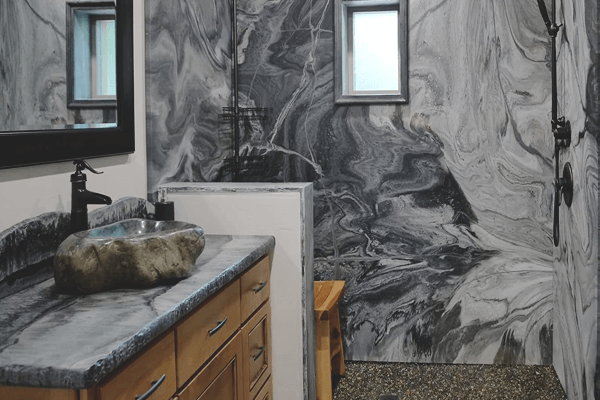Epoxy known to the novice DIY-er is super bonding waterproof glue. Also known as a type of polymer which when combined with other chemicals is an industrial adhesive used to build airplanes and cars, as well as to create ideal flooring, countertops and for at-home repairs and fixes. Often the question for folks who are building, engineering and restoring their bathrooms is an epoxy be used on your shower floor? In this article you will learn whether using epoxy resin on a shower floor is recommended.
Applying epoxy coating offers your bathroom excellent durability especially when utilized in the shower. You’ll find that when epoxy is applied as a finish to your shower floor, it will give you a reliable coating that is waterproof, safe and convenient to keep clean while lasting up to 20 years.
Available in a variety of color finishes, users can also select a clear patina to protect the tile design on the shower floor. The other main use for epoxy on your shower floor is as an alternative grout to cement grout. Whether you are installing new tile or seeking to restore old grout, epoxy is an excellent fix.

Contents
Can You Epoxy A Shower Floor
When selecting the epoxy resin reading the directions thoroughly is absolutely essential. This waterproof sealant must be applied correctly. It is important to know how long the epoxy coating will dry and cure. Using epoxy on your shower floor has numerous benefits for long lasting wear. Even a thin coat as the finishing touch can provide extra protection. The waterproof value of epoxy is a worthy do-it-yourselfer investment.
Using epoxy as a sealant, decoration, and grout for tiling is both a popular and safe way to complete a shower floor. It is the most valued and appreciated material used in a bathroom environment, especially if you have a steam shower feature. Full of moisture and warm air, the bathroom needs a dependable and predictable waterproof material that won’t attract bacteria, won’t be harmed by cleaning disinfectants and other environmental build-up.
Epoxy as a sealant
Epoxy flooring will not only keep the shower safe from water damage in the future, the material literally acts as a sealant and is anti-corrosive. Think of the resin hardening when the chemical makeup of the polymer molecules are processed. The result transforms from a soft epoxy into a solid. And, once applied to the shower floor, the epoxy will take up to one week to cure or harden to create the seal, every shower deserves. The 7 day (or more) curing process of the epoxy coating allows for complete waterproofing and sealing the area.
Epoxy as a protectant
Once applied and cured, homeowners like to keep epoxy in their home repair tool box. As stated earlier, this type of resin protectant is non-porous and waterproof. Another benefit to epoxy is it is resistant to bacterial and fungal growth, protects against urine and strong cleansers and is anti-corrosive.
Epoxy as the décor inspiration
Trending in home improvement inspiration, at-home interior designers are opting for easy and versatile looks for bathrooms. Today, major epoxy resin brands offer a versatile color wheel for shower floors and walls. From concrete or granite finishes to metallic finishes of opulent golds and coppers to bright statement hues such as Mediterranean blues, Moroccan teals and greens, epoxy is a versatile and popular product.
Epoxy as grout
Unlike traditional cement grout, epoxy when used as a grout material is a resourceful choice for your shower floor. Again, this material offers strong waterproof, durability and stain-resistant traits. Epoxy grout is reliable – your bathroom tiled floor will avoid any forms of cracking, discoloring and even shrinking. An epoxy grout bonds shower floor tiling very well as well as refreshing deteriorated, stained or cracked grout.
Epoxy grout is a little bit more of a challenge to apply due to its nature of setting quickly versus cement grout. Experts suggest applying the epoxy grout in stages. And, as recommended earlier in this article, we implore you to read through all of the instructions, and to have a clear understanding of what tile materials are best used with epoxy grout. But all in all epoxy grout can be rewarding.
Epoxy as a shower floor fix-it
So if your shower floor has seen better days, it might be time to give it a facelift with a coat of epoxy resin. Use the polymer material to seal a fractured shower pan, and waterproof large or small cracks within the shower base. Epoxy grout can be used on top of cement grout for extra protection and to fill in holes in the grout that may have broken down over the years. If your shower’s grout needs a full overhaul or if your floor shower tiles are loose, a bigger job using epoxy may have to be done.
Novice do-it-yourself homeowners tend to rush the process when using epoxy. Here are a few things to keep in mind – consider it your epoxy application checklist.
Prepare desired surface
Proper surface prep is key to a successful epoxy application. Clean your surface materials thoroughly. Remove the metal hardware (drain), remove loose paint and rust, clean the area and it must be completely dry before application.
Mix the two-component epoxy system properly.
Mixing the two components accurately avoids sticky floor results and poor curing of the resin.
Prime and seal surface thoroughly
Avoid bubbling or air that seeps into the epoxy coat. Clean well. Let it cure assiduously.
Avoid applying epoxy on porous surfaces
It is advised to NOT use epoxy on porous tiles such as ceramic and any other natural stones including marble, limestone, travertine, basalt, slate, and more.
How do you buy epoxy
Major home improvement retailers sell a variety of epoxy products for installing shower floors. You can walk right in and choose an epoxy shower kit which consists of countertop epoxy, quick coat, a roll of fiberglass mesh and epoxy thickener.
Customize your shower floor with available liquid epoxy dyes to create a variety of bathroom styles. The dyes give you the creative tools to imagine natural stone looks such as marble, granite and quartz, dynamic color splashes of neon, and even glitter.
Slippery flooring
The glossy finish of epoxy flooring is slippery. Today’s leading epoxy manufacturers offer a non-slip epoxy paint product. Specially engineered to be skid-free, the non-slip epoxy paint is a good alternative to ugly shower mats or stickers. Today almost 70% of home improvements are attributed to DIY-ers. Epoxy is one of those easy to use and obtain materials that can make your bathroom a safe, waterproof and beautiful room. DIY-ers can definitely rely on epoxy resin for shower floors. Do your research before delving into this at-home project for the best application and best results you can live with.
